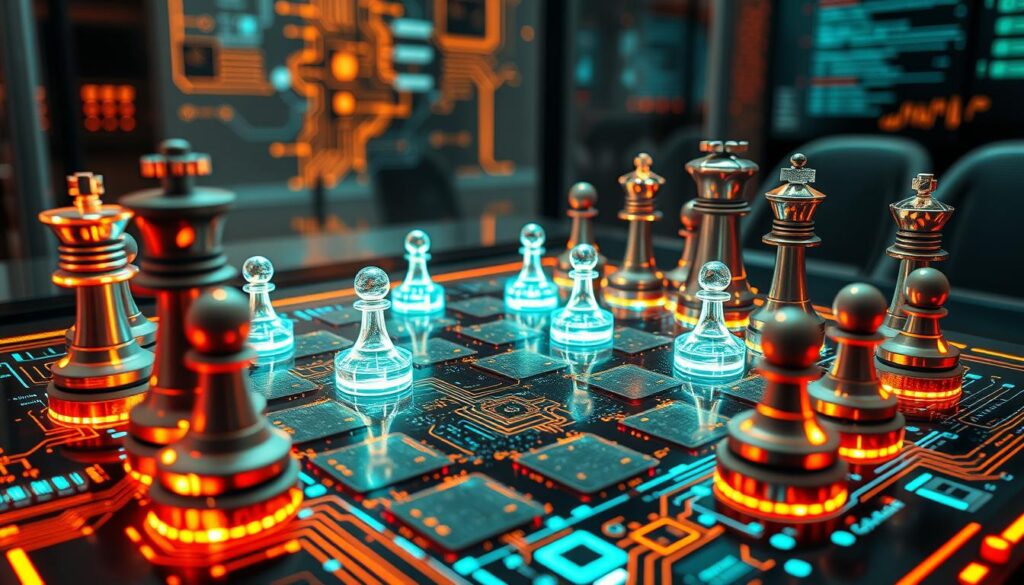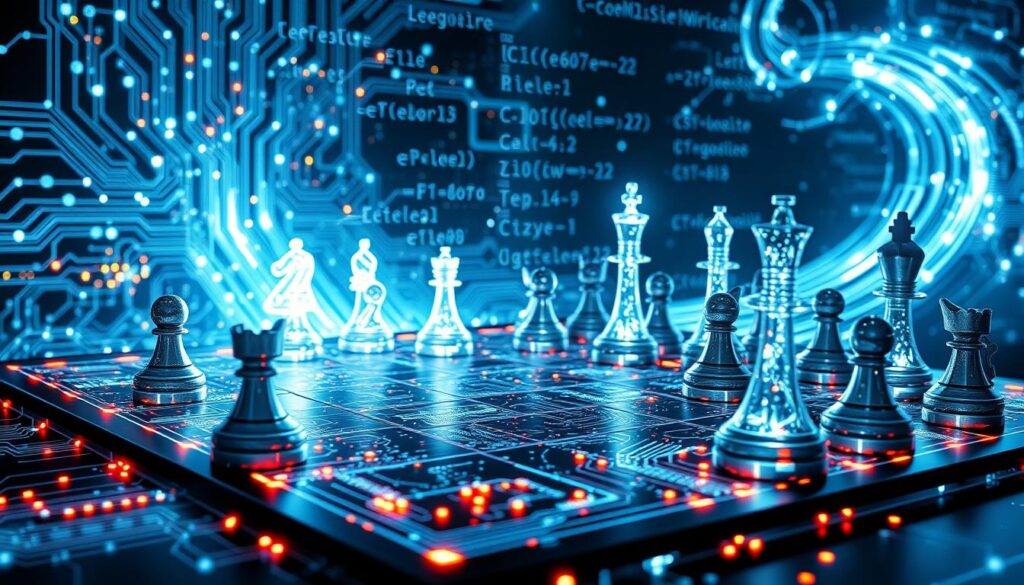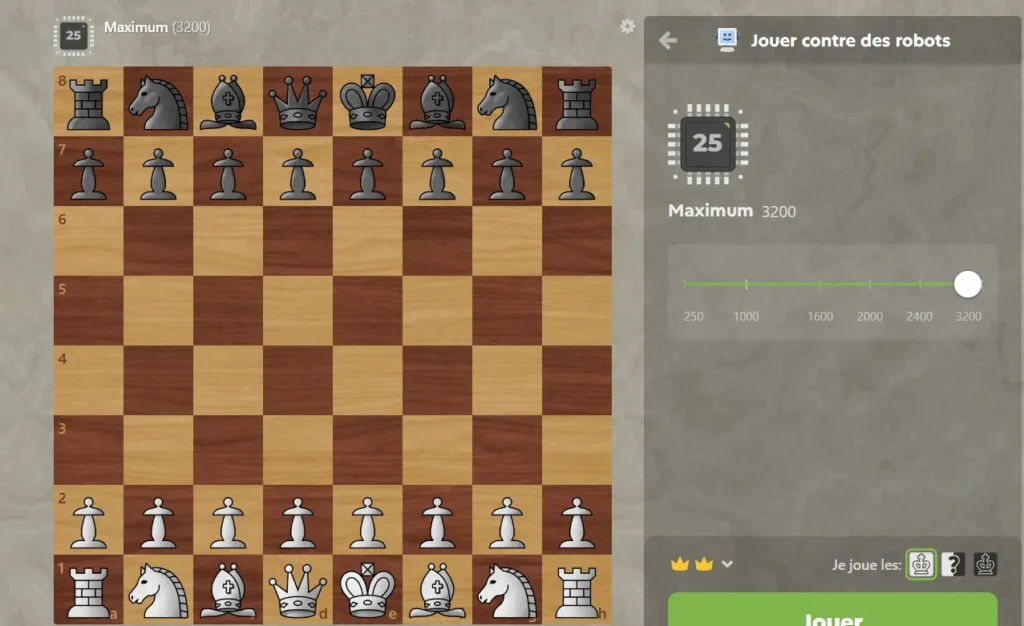Can chess and AI work together to make the game better without taking away the fun? Artificial intelligence in chess has brought big changes. Now, AI programs can look at millions of moves in seconds. They also have huge databases for endgame strategies.
This makes us think about how chess engines have evolved. From Deep Blue to Stockfish and AlphaZero, how will these changes affect your game?
The mix of chess and AI is changing the game. Online platforms have made it easier to play and connect with others. You can learn more about chess and improve your skills with AI’s help.
AI lets you analyze games in new ways. It gives you tips to get better, all while you learn about AI in chess.
Table of Contents
The Evolution of Chess and AI: From Deep Blue to Modern Systems
As you dive into the world of chess and AI, you’ll see big steps forward in chess ai techniques. It all started with Deep Blue, made by IBM in the 1990s. Deep Blue could check billions of moves every second, making it a tough opponent for humans.
In 1997, Deep Blue beat a world chess champion, Garry Kasparov, in a rematch. This was a big moment for machine learning for chess. Since then, engines like Stockfish and AlphaZero have kept getting better. They use new chess ai techniques and machine learning for chess to play better.
Some key moments in chess AI’s growth include:
- AlphaZero beating Stockfish in 2017 showed how deep learning can master games like chess.
- Leela Chess Zero beating Stockfish in 2019 showed the power of machine learning for chess in making strong engines.

Now, engines like Stockfish and AlphaZero are leading the way in chess ai techniques and machine learning for chess. They use advanced algorithms and lots of power to help chess players and fans. They analyze games and help improve how we play.
Understanding How Chess AI Thinks
Ever wondered how chess AI makes decisions? It’s all about complex algorithms and deep learning for chess. These systems can analyze millions of board positions every second. This lets them evaluate moves and predict outcomes with great accuracy.

The journey starts with classifying moves as brilliant or not using neural networks. This judgment is based on how well a player does compared to others. It looks at piece values, the board’s layout, and more to give a score for each position.
Several things affect how chess AI decides:
- Piece values: Each piece has a value, like pawns and queens.
- Board position: The layout of pieces, including control of the center.
- Central control: Being able to move freely in the center.
- King vulnerability: Keeping the king safe from attacks.
Chess AI uses these factors and deep learning to understand the game deeply. This has made AI chess programs better than humans. They often beat grandmaster players. Exploring chess AI reveals how these systems think and play.
Machine Learning Techniques in Modern Chess Engines
Exploring chess and AI reveals how machine learning has changed chess AI. It has led to more advanced engines. Reinforcement learning in chess AI has boosted engine performance. Now, engines can check thousands to millions of positions per second.
AlphaZero is a great example. It uses reinforcement learning by playing games against itself. This helps it improve its algorithms.
Chess neural networks play a big role in creating ai-powered chess strategies. These networks help engines come up with new strategies. They have even influenced top human players.
AlphaZero’s strength is over 3,400 Elo. This is higher than the highest Elo rating a human has achieved. Magnus Carlsen had 2843 in 2017.
Modern chess engines have some key features:
- Reinforcement learning through self-play
- Use of chess neural networks for strategy generation
- Advanced algorithms like Alpha-Beta Pruning and Monte Carlo Tree Search (MCTS)
The effect of machine learning on chess engines is clear. AlphaZero beat Stockfish in just four hours of training. It won 28 games, drew 72, and lost 0 in 100 games. This shows how ai-powered chess strategies can enhance gameplay.
| Chess Engine | Elo Rating | Features |
|---|---|---|
| AlphaZero | 3,400+ | Reinforcement learning, chess neural networks |
| Stockfish | 3,300 | Alpha-Beta Pruning, Quiescence Search |
The Impact of AI on Professional Chess
In the world of professional chess, AI has made a big difference. Chess AI has become key for top players to prepare for tournaments. They use AI tools to analyze games and sharpen their strategies.
AI has made chess more complex and detailed. Players can explore many game paths and openings. This has cut down on mistakes and boosted the complexity of strategies.
For instance, machine learning algorithms help players spot patterns in data. These patterns might not be clear to humans.
Some main benefits of AI in chess include:
- Improved analysis and strategy
- Enhanced player performance
- Increased accessibility to chess education and coaching
AI has also led to the creation of top chess engines like Stockfish and Leela Chess Zero. These engines play better than human grandmasters. They help analyze and enhance chess.
AI has also brought new tools and technologies to players. Online platforms like Chess.com and Lichess.org offer AI tools for analysis and coaching. These tools help players of all levels get better. Here’s a look at some of these platforms’ features:
| Platform | Features |
|---|---|
| Chess.com | AI-powered analysis, coaching, and tutorials |
| Lichess.org | AI-powered analysis, coaching, and puzzles |
Popular Chess and AI Platforms for Players

Exploring chess and AI, you’ll find many platforms for all skill levels. Artificial intelligence in chess has made learning easier. Online chess platforms offer a wide range of tools, including chess and AI features.
Popular chess engines include Stockfish, Komodo, and Leela Chess Zero. Stockfish has won the World Chess Engine Championship 13 times. Komodo is known for its stability. These engines work on Windows, Mac OS X, Linux, iOS, and Android.
Chess.com is a top online platform with many bots for players. It has a move timer for a competitive feel. Other platforms like Shredder Chess, Fritz, and HIARCS also use chess and AI to help players improve.
When picking a platform, think about your skill and style. Chess.com has bots for all levels. Stockfish and Komodo offer advanced tools for skill improvement. Artificial intelligence in chess makes these platforms engaging for all players.
Key features to look for include:
- Move timer and competitive experience
- Range of bots with varying difficulties and personalities
- Accessibility on multiple platforms
- Advanced features and tools for improving skills
By considering these points, you can find the best platform for your chess and AI needs. This will help you improve your game with chess and AI.
Improving Your Game with AI-Powered Analysis
As you keep working on your chess skills, you can use chess ai techniques to review your games. This helps you spot areas where you can get better. With machine learning for chess, you get insights into your strong and weak points. This lets you work on improving specific parts of your game.
Some benefits of AI-powered analysis include:
- Personalized feedback on your gameplay
- Identification of tactical strengths and weaknesses
- Analysis of opening and endgame strategies
For instance, if you aim to boost your rating from 1100 to 1400, AI analysis can pinpoint key areas to focus on. This might include tactical strengths and weaknesses. By improving these areas, you can build a more balanced game. This increases your win chances.
Also, AI platforms give you access to huge databases of games played by top players. With machine learning for chess, you can elevate your game. You might reach a rating of 1700 or even 1951.
The Future of Chess in the Age of Artificial Intelligence
Exploring chess today, you’ll see how artificial intelligence has changed the game. Chess algorithms have grown smarter, letting computers check millions of moves. This has greatly helped players see new strategies.
The use of deep learning for chess has brought a new level to AI. Now, AI can learn from itself, not just from old games. This means AI can make moves without fixed plans.
AI has made chess more popular worldwide. It has helped both pros and hobbyists learn faster. Playing chess boosts memory, focus, and problem-solving skills.
AI in chess shows how important games are for our brains. As machines do more tasks, games help keep our minds sharp.
Some key benefits of AI in chess are:
- Improved analysis and strategy development
- Enhanced cognitive skills, such as memory and concentration
- Increased global community engagement and learning opportunities
As AI keeps getting better, we’ll see more cool uses of chess algorithms and deep learning for chess. Whether you play for fun or seriously, chess is more thrilling than ever. There are endless chances to learn, improve, and compete.
Ethical Considerations in Chess AI Development
Exploring chess and AI brings up important ethical questions. The use of AI in chess has raised concerns about fair play and cheating. But AI can also help detect cheating and ensure a fair game.
AI can analyze huge amounts of data, giving insights humans might miss. Chess neural networks help create smarter AI that learns and adapts. Yet, it’s vital to address the ethical issues AI raises in chess.
Some key ethical issues in chess AI development include:
- Ensuring fair play and preventing cheating
- Protecting player data and maintaining confidentiality
- Developing AI systems that are transparent and explainable
In conclusion, the growth of AI in chess brings up big ethical questions. As you dive deeper into chess and AI, remember to focus on fairness, transparency, and accountability. This ensures AI benefits all players.
| AI System | Benefits | Challenges |
|---|---|---|
| Chess Neural Networks | Improved analysis and insights | Potential for bias and error |
| Ai-Powered Chess Strategies | Enhanced playing capabilities | Risk of cheating and unfair play |
Conclusion: The Harmonious Future of Human and Machine Chess
The relationship between chess and AI is complex and always changing. From the first chess AI pioneers to today’s ai in chess gaming, the field has changed a lot. Chess engines are now better than humans at solving problems, but the game’s future is in working together.
Today, players use AI to improve their game and find new strategies. Tools like Stockfish and AlphaZero have opened up new possibilities. This teamwork between humans and machines could make chess even more exciting and complex.
Future advancements in chess ai development will change the game even more. AI will help with coaching and training for all players. As AI becomes more part of chess, the difference between humans and machines will fade. This will usher in a new era of chess, beyond what we know today.
FAQ
How have chess engines evolved over time?
Chess engines have come a long way. From Deep Blue to Stockfish and AlphaZero, we’ve seen big leaps. Machine learning has been key in making these engines smarter.
How does chess AI think and analyze moves?
Chess AI uses neural networks to judge moves. Deep learning helps them analyze games with great detail. This gives players useful feedback and tips.
What are the latest machine learning techniques used in chess AI?
Reinforcement learning and neural networks have changed chess AI. They’ve made engines and strategies more advanced. This has boosted performance and created better learning tools.
How has AI impacted professional chess?
AI has greatly influenced professional chess. Top players use AI to get ready for games. AI engines have made the game more complex and strategic.
What are the popular chess and AI platforms for players?
Online chess platforms have grown a lot. They offer many AI-powered tools and resources. These help players learn and improve their skills.
How can AI-powered analysis improve my chess game?
AI analysis has changed how we review chess games. It uses machine learning to give detailed feedback. This helps players make better decisions and improve their game.
What is the future of chess in the age of artificial intelligence?
The future of chess with AI is both exciting and uncertain. AI is helping us understand the game better. It’s also making engines more advanced.
What are the ethical considerations in chess AI development?
As AI’s role in chess grows, ethics become more important. Fair play and cheating detection are key. AI development must be open and accountable.




